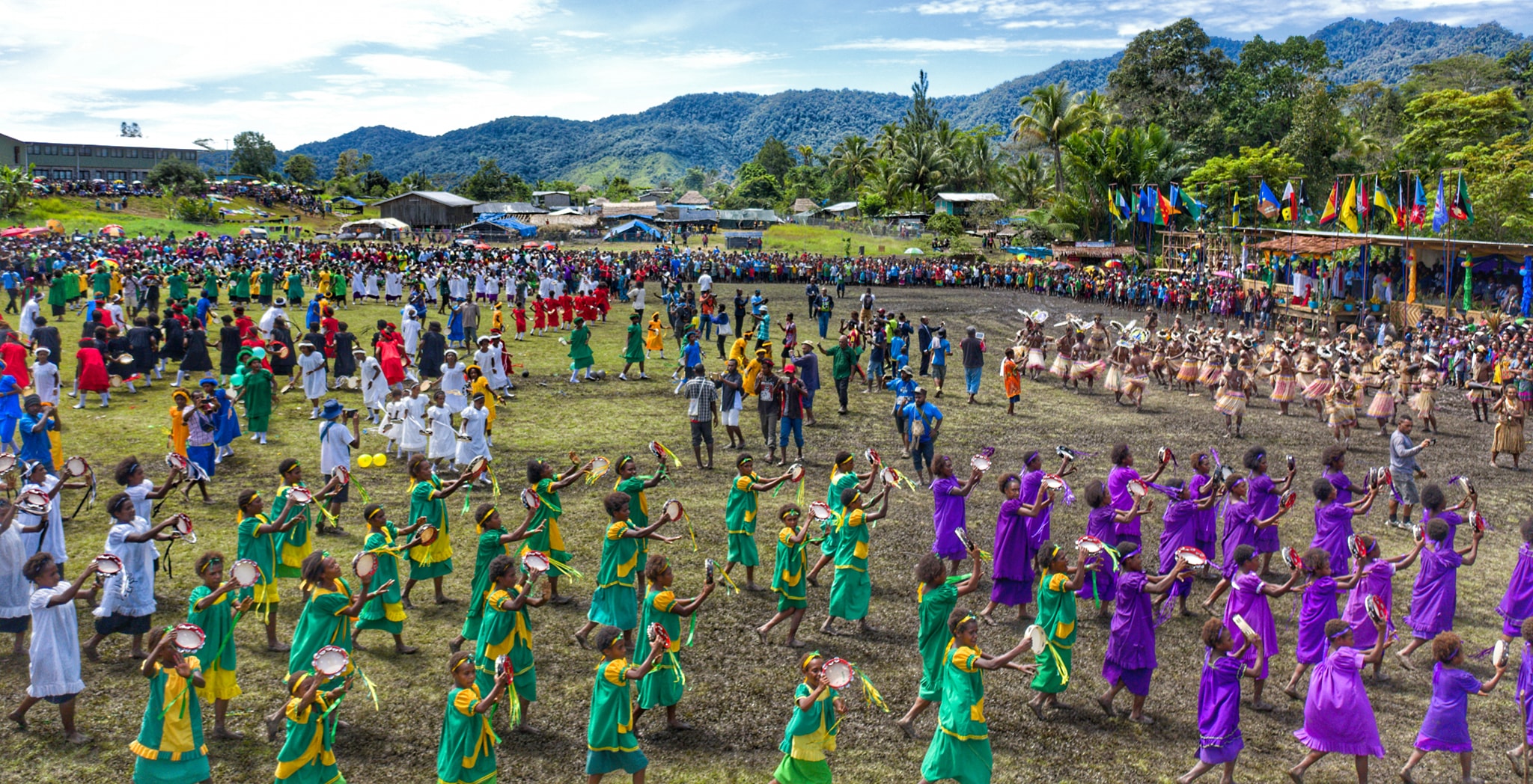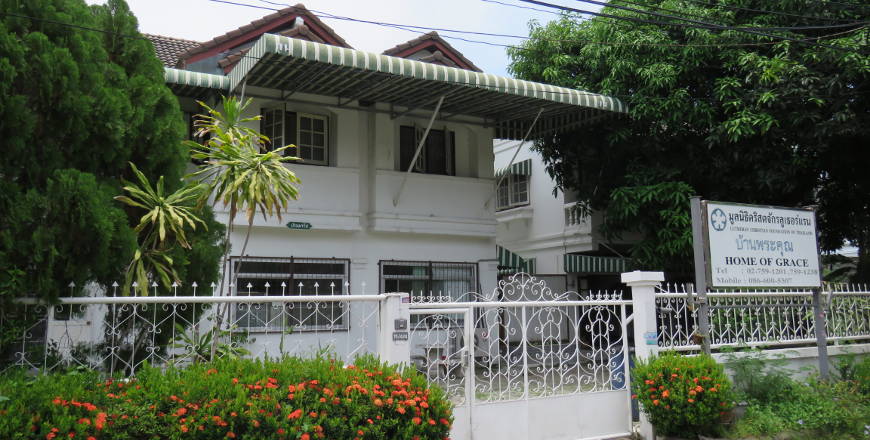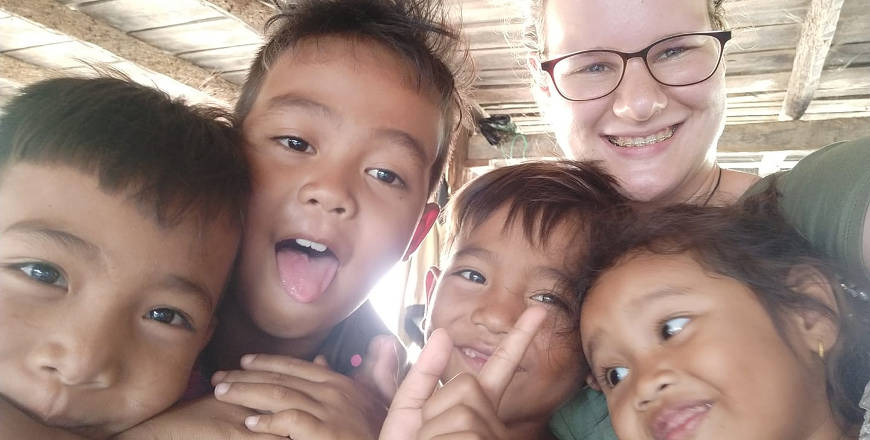The sights and sounds of Synod in Papua New Guinea
‘The sound of random groups singing from huts on the hillside, drums beating, the generator that kicked in for limited hours of power, heavy rain each night, and a pig outside my window, put me to sleep each night’.
In 12 January 2020, Bishop David Altus represented the LCA at the Synod of the Evangelical Lutheran Church – Papua New Guinea (ELC-PNG). He reflects on how this experience was a blessing, a privilege and an adventure!
The road to the 2020 Synod of the ELC-PNG was a steep climb of muddy slopes to a ridge in Boana District, about a three hour drive from Lae, passing tiny villages lined with palm and other branches, signs of welcome and hospitality. Many delegates travelled in people-laden trucks, while others walked. We heard that one lady had died from ill health during her journey, and a road accident on the return journey claimed the lives of two others. Travelling to and from Synod was an exercise of faith, but despite the topographic separation which the people experience, there was a tangible joy in their coming together, that was evident from the start.
Three houses were built for each of the 17 Districts represented and each District could bring 50 delegates, and did so.
The opening service was quite a spectacle. Thousands of people lined the oval with much colour, music and dancing by young people. I was placed behind some empty chairs which were soon filled by the Prime Minister and his entourage who helicoptered in. The Church – State relationship is nowhere near as separated as in Australia, which is both opportune and problematic for the church in PNG.
Bishop Jack Urame spoke of being sure of the basis of our faith, and of giving witness to the Gospel in words and actions, based on 2 Timothy 2:15, the Synod theme. He challenged and inspired the people about those who first brought the Gospel to them, and warned against laziness, a theme that came out from time to time. Bishop Jack is a gifted man. He seemed to know when to fire the people up, he comforted them and seemed to know when and how to gently admonish during the Synod. At least that was my reading of things, as I have no Pidgin so was literally reading between the lines and the body language.
Mornings began at 5am with the sound of drums for two hours, then a brief drive down the hill through the settlements to the Synod venue, which had been purpose built. (After Synod it would be given to the local school to use). It was a good venue which seated about 900, although always with hundreds more at the door or camped on the hillside, rain hail or shine, to be part of the action. The people were clearly keen to listen, their love for their church evident, as well as respect for the speakers and the chair. Passions arose during discussions but never got out of hand. Four hour sessions with no break on plastic chairs was a challenge at times, but time seemed to pass quickly as my senses were engaged and interest maintained.
Mornings always began with singing, which was led by different groups and types of music. One choir was conducted by a former prisoner who had come to faith. This was followed by an hour of Bible study, led by Mick Hauser. This was an unexpected blessing for me, as he spoke largely in English, but it also gave me an opportunity to see and hear him in teaching mode. He clearly relishes his teaching role and I was impressed with what I heard of the key themes: Law/Gospel lens, word alone and the theology of the cross. The people listened intently and received the teaching well.
The early days of Synod were taken up with reports from Bishop Jack and other leaders. The treasurer’s report took substantial time and District Bishops were also expected to give brief reports. A lengthy report was given by a mission aviation company that is expanding to remote areas, which was met with enthusiasm. Time was always a problem and yet not a problem.
I had the opportunity to address Synod on Tuesday morning. People were particularly interested in the fires in Australia, which they had heard about from news reports at the time. One afternoon I strolled through the village and markets with Mick Hauser and visited the District Office and Synod displays.
Overall, it was a very enriching faith and life experience. While the language barrier meant I could not fully appreciate the nuances of what was happening, I felt I could identify the topic, and read tone and some body language as to how people were reacting to what was being discussed. The church clearly has many challenges, as does the country as a whole, but I was inspired by the faith, faithfulness, and perseverance of the people I met, and I appreciated observing Bishop Jack’s leadership. Some things are the same the world over, but I found the cultural and faith expression differences to be enriching.
I have always wondered if I might get to PNG, having had four uncles serving there over the years, so I was grateful to have this opportunity from a personal perspective. The family connection was very helpful at times. Many thanks to the LCA and Bishop John for giving me this opportunity.
Many of our partner churches are working in new territory for the kingdom of God; therefore, spiritual attack is their everyday reality. As a member of a congregation, school, or family, or a couple or individual, you are invited to commit to praying for our partners in mission. For regular prayer point updates, go to www.lca.org.au/international-mission/act-now/pray
Read more stories about our partner church in Papua New Guinea at http://www.lcamission.org.au/category/stories/international-partners/papua-new-guinea/




